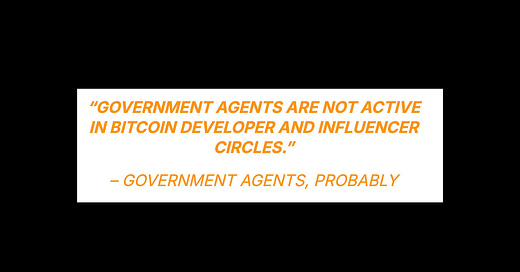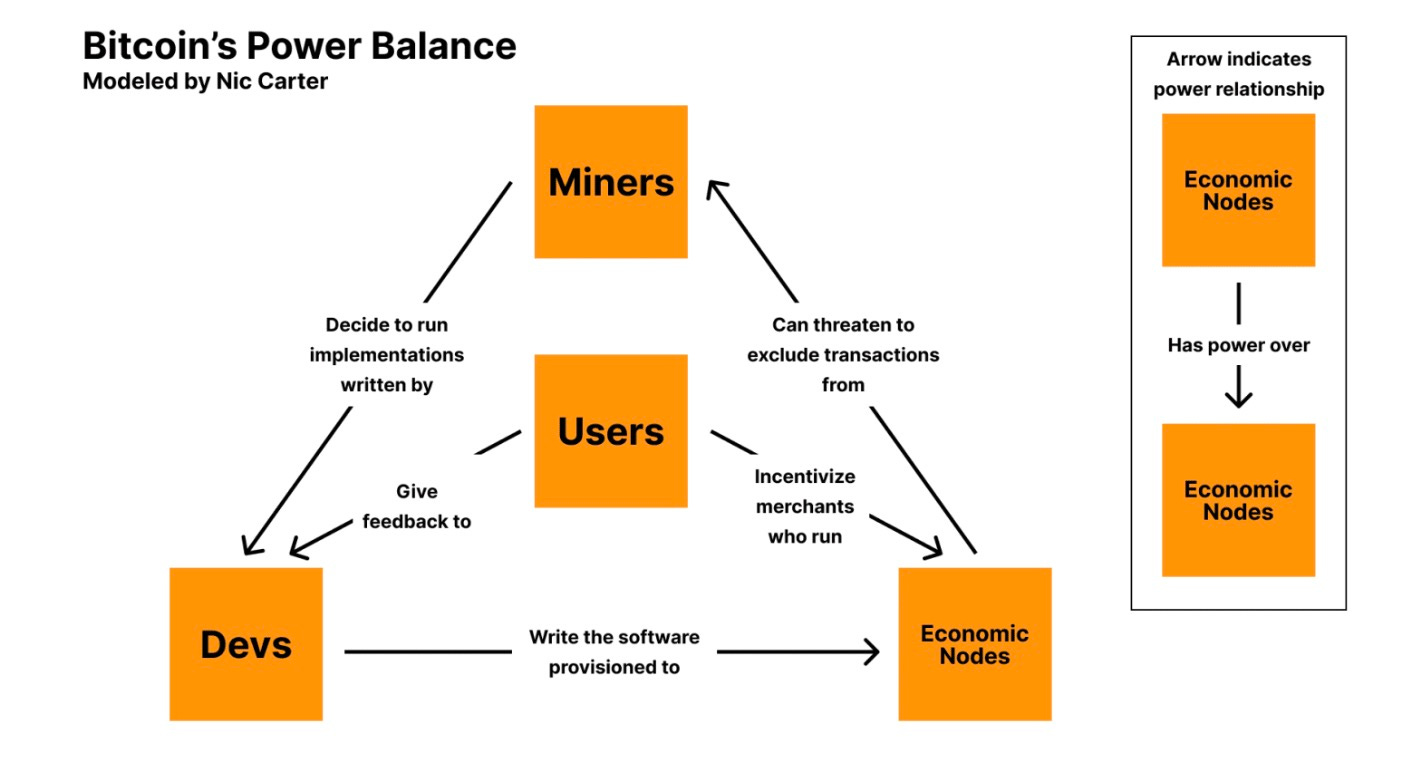French translation pdf
Bitcoin was never just code—it was a revolt. A monetary insurrection against inflation, central banks, and the creeping tide of technocratic control. Its architecture was built not merely on cryptographic proofs, but on a deeply held belief in individual sovereignty, decentralization, and resistance to coercion. Today, that foundation is under attack—not from governments or regulators, but from within. Under the guise of technical improvement and philosophical inclusivity, key actors are working to erode the cultural core that once made Bitcoin unbreakable. This is not a dispute over software updates; it is a battle for the soul of the protocol. The outcome will determine whether Bitcoin remains a tool for the free man—or becomes yet another compromised system bent to the will of insiders.
Essay: Cultural Corruption as Existential Threat to Bitcoin
The commentary reveals a profound concern: Bitcoin, once defined by its principled user base and austere technical integrity, is facing internal decay through cultural infiltration. What began as a grassroots movement grounded in personal sovereignty, minimalism, and rejection of centralized control, is now being reshaped by newcomers who neither share nor respect these founding ideals. The speaker, a veteran in the Bitcoin space, warns that the true danger is not technical—it is cultural. This is a classic civilizational dilemma: erosion from within.
At the heart of the issue lies an attack masked as innovation. The insertion of non-financial data—such as JPEGs and NFTs—into the Bitcoin blockchain is likened to spam: technically valid, yet philosophically corrosive. Like weeds in a cultivated garden, these additions may seem minor at first, but they slowly choke out the original purpose. Historically, early Bitcoiners fought such misuses with rigor, employing spam filters and social pressure to repel non-monetary use cases. That vigilance, the speaker argues, has been lost.
The dangers are manifold. First, there is the technical bloat. Storing arbitrary data in blocks increases node requirements, which in turn makes running a full node more expensive and less feasible for ordinary users. This leads to centralization—anathema to Bitcoin’s ethos. Second, it invites a user base that doesn’t care about the monetary principles but sees Bitcoin merely as a decentralized storage layer. These users do not prioritize freedom, decentralization, or node sovereignty. Their priorities—profit, novelty, speculation—inevitably distort the development agenda.
A more insidious danger emerges in the normalization of abuse. As spam becomes standard, the culture shifts. Developers begin to compromise, not from technical constraint but due to cowardice or ideological confusion. The rejection of spam filters under the guise of “freedom” is treated as a logical contradiction: if filters don’t work, why remove them when they still disincentivize misuse? Worse, GitHub moderation policies are selectively enforced, silencing critics while tolerating those pushing the very changes that threaten Bitcoin’s core.
The final and most alarming threat is redefinition. Bitcoin is being reshaped not by enemies from outside, but by settlers within. These actors—many migrating from failed or compromised chains like Ethereum and Solana—are pushing Bitcoin toward a Swiss Army knife model: a blockchain for all purposes. This dilutes its function as money and replaces a principled user base with one that tolerates or even champions misuse. Just as a nation loses its identity when it forgets its values, so too does a protocol.
This is not a technical war; it is a war for the soul of Bitcoin. It is the battle between a cohesive culture that values freedom and responsibility, and a formless flood of users who merely wish to exploit the network. The speaker’s urgency is rooted in the belief that Bitcoin cannot survive this dilution. Cultural rot precedes technical collapse. If the values are lost, so too is the protocol.
***
The current crisis in Bitcoin development is not rooted in code but in values. The warnings laid out by veteran contributors like Bitcoin Mechanic have now been corroborated by others such as Matthew Kratter and Samson Mow. A cultural infection has entered the Bitcoin ecosystem—one that seeks to redefine Bitcoin from a hard-money tool of self-sovereignty into a bloated, multipurpose data chain indistinguishable from the failed projects it originally set itself apart from. The clearest signal of this shift is not simply the technical debates about “OP_RETURN” limits or mempool filtering; it is the rise of credentialism, paternalism, and a closed circle of technocrats who seek to dictate terms to the very people who secured and spread Bitcoin in the first place.
Central to the alarm is the manipulation of governance. Once governed by “rough consensus” and the implicit moral obligation to reflect the values of node runners and users, Bitcoin Core now appears to be weaponizing its control over GitHub discussions. Contributors who challenge the expanding data limits or who raise concerns about spam have been banned from discussion. This is not neutral software maintenance—it is political gatekeeping. Those who point out conflicts of interest, such as when a corporate entity both exploits a loophole and lobbies to institutionalize it, are silenced. The response from Bitcoin Core defenders is that only contributors matter—ordinary node runners, donors, even long-standing supporters, are now treated as irrelevant unless they have code commits. This violates the principle that Bitcoin is a monetary system secured by its users, not a technocracy ruled by unelected engineers.
The contradiction in their logic is damning. Spam filters, which are claimed to be ineffective, are simultaneously seen as such a barrier that they must be eliminated to enable more “flexible” data usage. Yet the empirical data shows the filter works—with over 99.995% compliance in recent blocks. If it didn’t work, there would be no need to remove it. This exposes the intent: not to improve Bitcoin’s functionality, but to redefine its purpose altogether. A system once meant to preserve user freedom is now being altered to accommodate non-monetary uses at the expense of decentralization and usability.
The broader danger is the undermining of individual node sovereignty. At stake is the right of every node operator to control what data they relay and store. Forcing all node operators to accept unfiltered data under the guise of software standardization is nothing more than centralized control masquerading as progress. This is not unlike the fiat mentality where bureaucrats decide what’s best for the people—regardless of the people’s will.
As Kratter aptly notes, this is not merely a technical or esoteric debate. It is a turning point. Bitcoin Core risks becoming irrelevant, not because Bitcoin is broken, but because it has lost the trust of the very community that made it viable. Developers can be replaced. Implementations like Bitcoin Knots can and will rise to reflect the true values of the users if Core continues down this path.
Ultimately, Bitcoin will survive, not because of code alone, but because of the vigilance and moral clarity of its users. This is the moment when cultural corruption must be recognized as an existential threat. As history shows, civilizations and protocols alike die not from sudden collapse, but from gradual compromise. The warning has been given. The lines have been drawn. Now is the time to defend what made Bitcoin unique—or lose it altogether.
***
The battle unfolding within Bitcoin is not one of mere technical disagreement—it is a confrontation between foundational values and creeping compromise. What was once a network defined by its users’ commitment to sovereignty, minimalism, and incorruptibility is now being reshaped by forces that neither understand nor respect those principles. The use of philosophical sleight-of-hand, selective enforcement, and institutional condescension is a deliberate attempt to obscure the transformation underway.
If the community tolerates this drift—if it permits centralization of culture, control over discourse, and the redefinition of Bitcoin’s purpose—it will inherit something unrecognizable. A monetary revolution born from clarity and courage will die by confusion and cowardice. Those who run nodes, who build infrastructure, who evangelize truth over trend—these individuals must now act. The time for trusting benevolent stewardship has passed. Freedom, once ceded, is seldom returned.
Other ways to support my work:
You can make a donation to my Bitcoin address:
399hePnn5L1LnfTHGE9ZV8BQwFz5CLJXsF
(copy and paste BTC address or scan QR code above with your wallet QR code reader)
Or use this form for other ways to contribute.
https://form.jotform.com/251179397505162
(click link or scan with phone scanner)



















Share this post